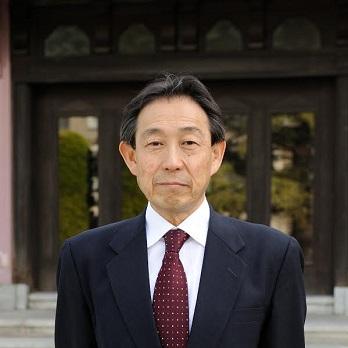Executive Director of the Interdisciplinary Cluster for Cutting Edge Research, Shinshu University
Vice President of Shinshu University
Tackling the "2025 Digital Cliff" through Cutting Edge Research
~Spearheading a new integrated research discipline~
- A Message from the Executive Director
Shinshu University established a five-pronged Interdisciplinary Cluster for Cutting Edge Research (ICCER), i.e. the Institute of Carbon Science and Technology, Center for Energy and Environmental Science, Institute for Fiber Engineering, the Institute of Mountain Science and the Institute for Biomedical Sciences in March of 2014. This strategic formation enabled Shinshu University to strengthen features that have been cultivated since the university's founding in 1949 and to upgrade its research capabilities to the next level. ICCER added a new research group christened the "Next-Generation Research Center" in October of 2016, consisting of five research centers, i.e. Research Center for Fungal and Microbial Dynamism, Research Center for Aerospace Systems, Research Center for Next Generation Medicine, Research Center for Social Systems and Research Center for Agricultural and Food Industries. Since its founding, Shinshu University's unique research organizations have taken on new challenges with the drive and imagination that transcends conventional thinking by virtue of sustainable methods. ICCER and the Next-Generation Research Center have come to play a leading role in promoting Shinshu University's research prowess. The organization's activities of the past five years have been reviewed in accordance with the University Regulations on ICCER, Article 5, and the group reorganized in April of 2019.
A phenomenal paradigm shift has occurred in the world of science and academia since the establishment of the organization five years ago. Innovation and research are now driven by data. In tandem with the rapid spread of open access journals, science and technology are making Big Bang-like advances of explosive speed and might. The intent of the organization at the time of reestablishment was to "have a finger of the pulse of society to anticipate future issues." Therefore, the newly developed ICCER was divided into two distinct mission-based groups: an advanced research institution that will blaze new paths for the university's pioneering research, and a group of research centers that proliferates the university's strengths and features. After a year and a half of discussions, three institutes, i.e.the Research Initiative for Supra-Materials, the Institute for Biomedical Sciences and the Reseach Center for Social Systems were authorized as the former group of pioneering research institutions. The latter group of three research centers, i.e. the The Institute for Fiber Engineering, the Institute for Mountain Science and the Research Center For Aerospace Systems were inducted into the university association to promote the university's originality.
The fourth industrial revolution driven by information and digital technologies have produced new systems that fundamentally change the way the world operates such as Swarm AI (Swarm Intelligence), XR (Cross Reality) and 5G (Fifth Generation Communications). Globalization by way of social networking services disregard previously established borders and show no sign of slowing down. The Ministry of Economy, Trade and Industry (METI) recently released the "DX Report". DX is an abbreviation for digital transformation, the irreversible structural changes with phase transitions that are now discreetly overtaking the world. If Japan does not get on board with this global change, it is forewarned that its international competitiveness will fall sharply to the tune of 12 trillion yen annually. METI has dubbed this the "2025 digital cliff" sounding alarm to Japanese companies that it will face dire consequences if they do not actively build and participate in digital infrastructures. The year 2025 happens to be the final year of the 2nd phase of ICCER. The new research cluster strategically promotes research with DX in mind and proposes a foundation on which Japan can confront the "2025 digital cliff". ICCER strives to pave the way for a bright future of our nation.
The planet is entering the age of VUCA, signified by the uncontained spread of urban sprawl. The term, formed from four keywords: volatility, uncertainty, complexity, ambiguity foreshadow the adversity humanity will soon face. In this unpredictable and uncertain time, ICCER will work preemptively to generate knowledge and lead the way by actively sharing its work with the world.
I would like to express my sincere commitment to the stakeholders and appreciation for their continued support and cooperation. - Executive Director of ICCER
Vice President of Shinshu University
MORIKAWA Hideaki, Ph.D.

MORIKAWA Hideaki
- ■Position
- Academic Assembly Professor (Institute of Textile Science and Technology), Ph. D. in Engineering
- ■Career
-
1984 Graduated from Division of Textile Science and Technology,
Interdisciplinary Graduate School of Science and Technology, Shinshu University1984 Kao Corporation 1990 Lecturer at Niigata Women's College 2003 Associate Professor, Faculty of Textile Science and Technology, Shinshu University 2006-2007 Visiting Researcher, German Institutes for Textile and Fiber Research Denkendorf (Germany) 2008 Professor, Faculty of Textile Science and Technology, Shinshu University 2021 Dean of Faculty of Textile Science and Technology, Shinshu University 2021 Vice President of Shinshu University
- ■Research Field
- Textile Engineering
Silk Science
System Engineering
- ■Research Theme
- Analysis and Development of Bio-inspired Material in Fiber/Textile Engineerinrg
Studies on new fiber/textile materials for Personal Protective Clothing
Studies on Statistical Properties for Silk Reeling Process
Studies on Spinning Behavior of Silkworm
Study on Silk nanofiber and its application
Studies on Functionalization of Fiber and Textiles










